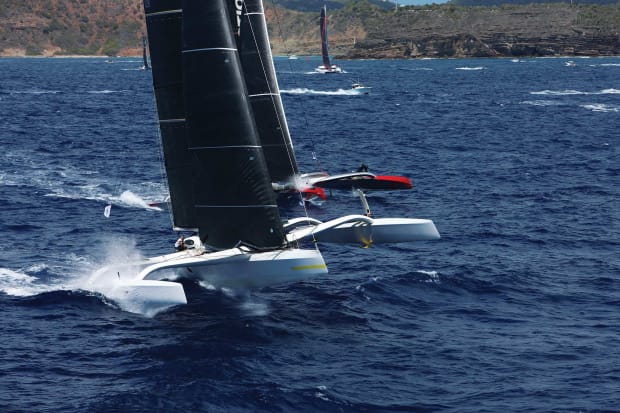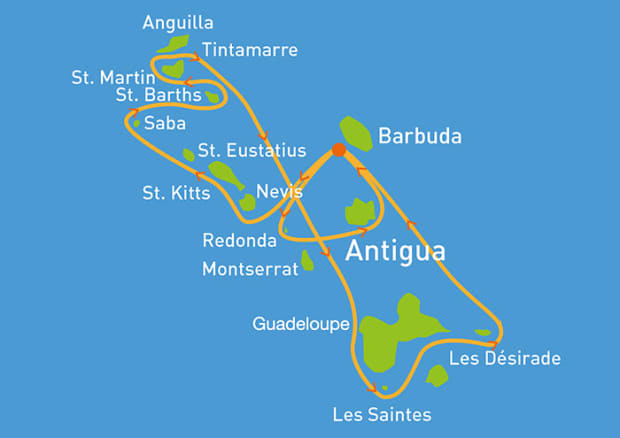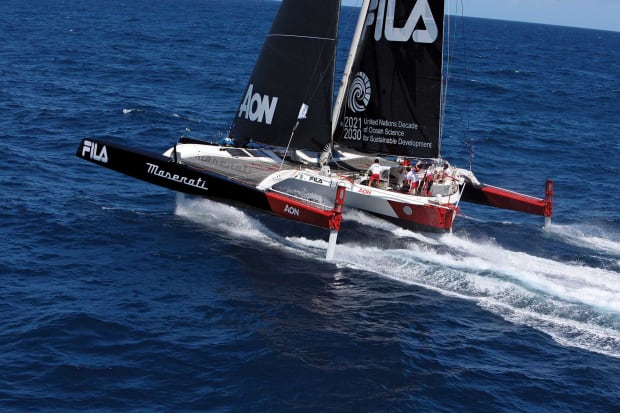
Offshore racing in the Caribbean is a relatively new concept. In years gone by it was deemed unsafe to even sail at night in the Caribbean, let alone hurtle around in darkness in a high-performance grand prix racing machine. With the advent of modern charts and navigational aids, though (that and a good deal of courage), the attitude to overnight racing in the Caribbean has changed. In 2009, the Royal Ocean Racing Club held the first edition of the RORC Caribbean 600. Since then competitors—those in the multihull sections, in particular—have been getting faster and faster. The current race record is over 10 hours quicker than the inaugural race, roughly 30 percent faster. American teams have favored well, setting race records and winning the MOCRA Class on numerous occasions. This includes the present race record holder, Jason Carroll’s MOD70 Argo, with a team from New York’s Larchmont Yacht Club.
Not only that, the RORC Caribbean 600 has a long attracted a range of performance-cruisers in addition to record-setting cats and tris. Gunboats, HH Catamarans and a number of other designs have been part of the entry list since the race’s inception. Because the MOCRA Rule considers the size, weight and performance of each boat in computing its corrected time at the finish, they often do quite well.
Held each February, when the northeast trades are usually pumping in from the Atlantic, the RORC Caribbean 600 is a nonstop offshore race around 11 Caribbean islands starting and finishing in Antigua. With myriad maneuvers, it has been described as 12 inshore races, all strung together. After the start outside Nelson’s Dockyard Antigua, there is only one laid mark off the reef at Barbuda. The rest of the turning marks are islands, where wind shadows and acceleration zones add yet another dimension to an already complex racecourse.

Again, multihulls have featured in the RORC Caribbean 600 since the get-go in 2009, with Claude Thelier and John Burnie’s ORMA 60 trimaran, Region Guadeloupe, winning the multihull section in the inaugural race. Physically exhausted, wringing wet and full of pride, the crew of eight posted an elapsed time of 40 Hours, 11 minutes, 5 seconds. “That was an incredible ride. We wanted to set a standard for others to beat. We pushed the boat really hard, and we never backed off,” said Burnie, who in addition to taking part was one of the brains behind the creation of the course.
In 2013 Californian Peter Aschenbrenner racing his Nigel Irens 63ft trimaran, Paradox, came within a whisker of beating the multihull course record, finishing just 11 minutes, 47 seconds out of time. As the name suggests Paradox was a blend between a racing and cruising multihull, weighing a couple of tons more than an ORMA 60—a sizable handicap that only made the crew’s showing all the more impressive.
In 2015, Paradox lined up yet again with another formidable opponent, Lloyd Thornburg’s American MOD70, Phaedo 3. The result was the multihull record being blown away by over six hours. In 2016, another six multihulls entered the race. Phaedo 3 was also back, taking on another MOD70, Concise, skippered by Ned Collier Wakefield with a British crew. Phaedo 3 beat Concise by under 10 minutes, in the process setting another new race record of just under 32 hours.
In the years since, the field has only become that much stronger, a reflection of the fact the RORC Caribbean 600 has become an established bucket list race: a winter combat zone for the world’s fastest boats, including both those with lead keels and those without.

In 2018, an impressive 11 multihulls entered the race, which was held in full-on conditions that saw Paradox take both the gun and the race win after time correction. However, it was an Australian entry that received a true hero’s welcome. Shaun Carroll’s 30ft Seacart Morticia completed the race with the crew living off biscuits and sweets for three days, often hitting double-digit speeds under bare poles. Morticia remains the smallest multihull to finish the race to this day.
Also making headlines for all the wrong reasons was Seattle sailor Greg Slyngstad’s 53ft custom catamaran, Fujin, which capsized the first night out. The highly experienced crew from the Pacific Northwest included the boat’s designer, Paul Bieker, and Olympic Gold medallist Jonathan McKee. Fortunately, after scrambling aboard the overturned boat, the crew were all successfully rescued.
The year after that was another notable one with no less than 10 multihull entries from Antigua, France, Italy and the United States. Adding to the drama a mere 48 hours before the gun, Jason Carroll’s Argo capsized at speed while the crew was out doing some training. Miraculously, the boat still made it to the start line, and 30 hours of explosive action followed. In the end, it was the Multi70 Maserati that took line honors, finishing just 7 minutes ahead of Argo and setting a new race record of 30 hours and 49 minutes. That same year the Gunboat 62 Chim Chim, sailed by San Diego’s John Gallagher, came out on top as the class winner, correcting out at just over half an hour ahead of Fujin, which returned to take second place in the wake of the previous year’s capsize.

In 2020, the winner of the MOCRA Class after time correction was Adrian Keller from East Hampton, New York, aboard his Irens 83ft catamaran, Allegra. But the headline battle was for multihull line honors with a trio of powerful 70ft trimarans all going head-to-head: Italy’s Giovanni Soldini aboard Maserati; Californian Peter Cunningham aboard PowerPlay; and perennial pace-setter Jason Carroll aboard Argo. This was the first time three MOD70s had taken part in the race, and the showdown did not disappoint.
All three boats had been modified with different foil packages. Maserati, for example, was now fully foiling with T-Foils on both rudders plus a “manta” foil on the daggerboard of her center hull and a pair of C-Foils on the outer hulls. Argo was also sporting T-foils on both rudders and C-Foils amidships, while Powerplay was using C-Foils, but not T-Foils on its appendages aft.
A nail-biting finish rounded off an epic light airs tactical battle with the lead changing hands seven times. In the end, PowerPlay with significantly less drag took the gun just four minutes ahead of Argo. Maserati fought all the way, but the boat’s many foils proved more of a hindrance than a game changer in the unusually light conditions.
Which brings us to the most recent running of the event in 2022 following a two-year hiatus: arguably the best multihull edition of all in the still fairly brief history of the race.
Ten multihulls took part in all, offering a fascinating lineup, all capable of winning the MOCRA Class. Among the boats at the start was Gilles Lamire’s French Multi50, Groupe GCA, winner of the 2019 Transat Jacques Vabres, putting in an especially impressive performance as it finished just over an hour behind the monohull line honors winner, the ClubSwan 125 Skorpios. A pair of French ORC50s, a new class for the 2022 Route du Rhum, was also racing. Lightweight, with a huge sail area and rotating mast, the two teams had a close battle with Christian Guyader’s Saveol taking on Quentin le Nabour’s Club 5 Oceans. After over 60 hours of racing, Saveol won the duel by less than 11 minutes.

A number of performance-cruising multihulls also competed in the 2022 race, including Italian Aldo Fumagalli’s Neel 47, Minimole, a Marc Lombard design. The smallest multihull in the race with a full interior and cruising accommodations to boot, Minimole had little chance of keeping up with the sporty larger multis, but with a significantly lower MOCRA rating than the entire class, its finish time of just over four days was admirable. Briton Andrew Bland’s Selika, a new concept from the drawing board of Frers Yacht Design with a full interior and a powerful sail configuration, was also there at the start, but failed to finish after sustaining some pretty serious sail damage.
As always, the battle for multihull line honors was the main attraction, with Carroll’s MOD 70 Argo crossing the finish line to take the prize, setting a new multihull race record of 29 hours, 38 minutes, 44 seconds, a mere 2 minutes, 13 seconds ahead of Giovanni Soldini’s Multi70 Maserati. Peter Cunningham’s PowerPlay had led in the early part of the race, but stalled in the wind shadow of Guadeloupe to finish third. This marked the first line-honors win for Argo, after having come in as the runner-up on two previous occasions.
“This race is always an emotional rollercoaster. I think we traded the lead with the other boats about five or six times,” Carroll said. “The last change was 20 minutes before the finish with Maserati. It was a boat-on-boat tacking duel. I am sorry for Maserati, because they sailed a great race. Before the awesome finish the closest match racing we had was in the lee of Nevis and St. Kitts. We traded the lead two-sail reaching doing 35 knots! At that pace everything happens so fast, and you have to plan in advance, but it is so exciting for sure.”

Selika at speed shortly after the start of the 2022 race
Adding to the drama, near the start of the final beat to finish, Maserati had apparently been leading by about three miles when it snagged a fish pot. This allowed Argo to close the gap to about half a mile on the rounding, after which it looked to be a one tack beat on port, with very little opportunity to make a strategic move—or so, at least, it seemed.
“We knew there was about a 30-degree header coming,” Carroll said. “We waited for that instability and chose to tack away, leaving Maserati with a decision, and they chose to cover us through the unstable conditions. From then on, we had a duel of about 10 tacks, more than we had done the whole race. We eked out a tiny lead, then Maserati tacked a little too close to us. Before they could build speed, we luffed them up a little bit and then pulled out the win.”
As for Maserati’s Soldini he, too, had nothing but good things to say about the 2022 event. “It was a very close, fantastic race the whole way. The level is very high, and it was just a case of nearly but nothing for us….we did get snagged in that buoy with our rudder, the second time this has happened in our races, and both times Argo has caught us! But it is okay. I think Argo sailed a wonderful race. Probably with our big foils we should have just gone straight and not into that tacking duel. This was a wonderful race, a great experience, and we have learned many things and we are ready for the next one.”
The 14th edition of the RORC Caribbean 600 will start from Antigua on February 20, 2023 and may very well top the 2022 event as the Route du Rhum will be finishing off the neighboring island of Guadeloupe a few months prior to the start. Fingers crossed, an extraordinary array of ballistic multihulls will be in the Caribbean, all of which could potentially compete in the 600 while they’re there. Eight Ultime tris, for example, are already entered in the Route du Rhum as are over 30 ORC50s. There is also talk of getting together up to six MOD70s. Currently, three brand-new Gunboat 68s are in the Caribbean as well.
As far as breaking the race record in 2023, there is no doubt conditions for 2022 were still far from perfect. Subject to getting the right weather conditions, the general consensus is that a large high-performance multihull is very capable of lowering the bar to below 29 hours. It will be fascinating to see if a fully tricked out Ultime can be quicker than a MOD70 as it makes its way around the twists and turns of the RORC Caribbean 600 course. Although the MOCRA rule seems to struggle rating some high-performance multihulls, 2023 could also see a number of similar designs racing in divisions. Ultimes, MOD70s, ORC50s, Gunboats and the usual contingent of performance cruisers—talk about a lineup!
Ed Note: Louay Habib has been the Royal Ocean Racing Club’s race reporter for every edition of the RORC Caribbean 600. For more on the race, visit caribbean600.rorc.org
Photos courtesy of RORC/Tim Wright
Multihull Sailor Summer 2022








